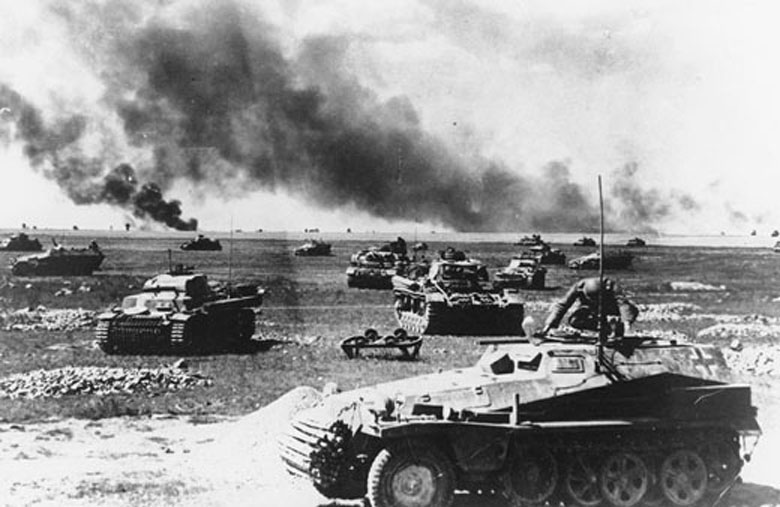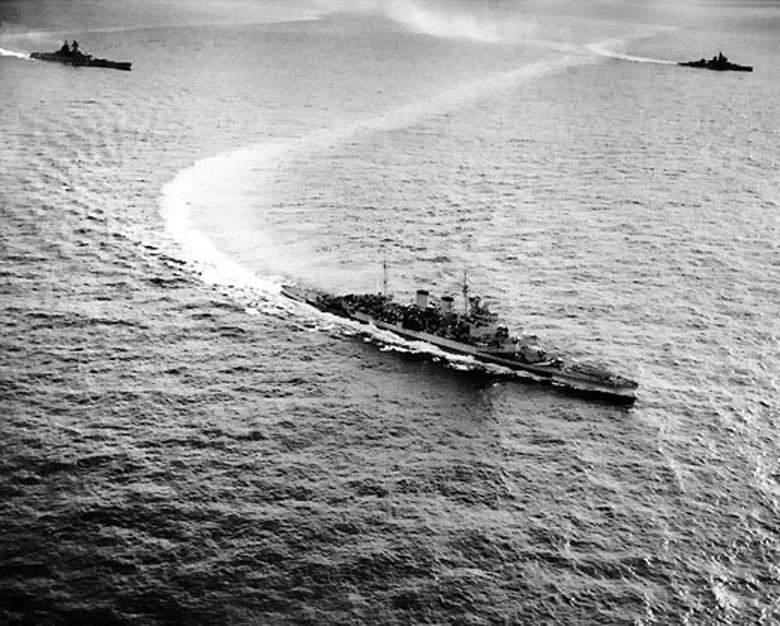Battle of the Atlantic
- The German steamer Hans Christopherson (1599t) sinks on a mine off Terschelling.
- The Italian submarine Torelli sinks the Norwegian tanker Ida Knudsen (8913t) west of Casablanca with loss of 5 crewmen. 14 survivors are picked up by the Portuguese trawler Altair.
Eastern Front
There are more German air attacks on Moscow. Hitler had goaded Göring into ordering the raid by disparaging the Luftwaffe for its failure to attack the Russian capital. A total of 127 Ju-88s and He-111s drop 100 tons of high-explosive bombs and 45,000 incendiaries. The Soviet authorities announce that they have withdrawn their forces from the line of the Dniestr.
FINLAND AND NORWAYAfter heavy fighting, the Army of Karelia reaches the eastern shore of Lake Ladoga at Salmy.
Germans Prepare for an Attack |
 |
Further to Hitler's Directive No 33, and specifically his desire to 'burn the Kremlin to ashes', the Luftwaffe mounts its first air raid against Moscow. Some 195 bombers are involved: Junkers Ju-88s from KG-3 and KG-54; Heinkel He-111s from KG-53, KG-55, KG-28, III/KG-26 and K.Gr-100; and Dornier Do-17s from KG-2 and KG-3. They are met by 170 Soviet fighters and heavy anti-aircraft fire over the city. In total, Soviet anti-aircraft guns fire 29,000 artillery shells and 130,000 maching-gun bullets during the raid. The Luftwaffe loses 4 aircraft shot down and drops 104 tons of high explosives and 46,000 incendiaries on the city. The Kremlin survives.
Soviet forces trapped inside the Smolensk pocket begin to pull back to the west of the Dniepr but suffer tremendous casualties due to constant German attacks. Fighting outside the pocket also intensifies as the LVII Panzer Corps comes under furious attack near Velikiye Luki and the XLVI Panzer Corps struggles to repel Soviet attacks at Elnya.
SOUTHERN SECTORGerman tanks close in upon Tarasche and Uman, all but enveloping the 24 divisions of the 6th and 12th Armies. The two armies number 130,000 men, 1,000 artillery pieces and 384 tanks. Kirponos orders Kostenko to wheel his 26th Army southwest to protect the withdrawal of the two embattled armies. Heavy fighting breaks out against German panzer units until July 25. The 9th and 18th Armies, falling slowly back toward the Dniepr, number 280,000 men.
[Indochina
Military bases in French Indochina are occupied by the Japanese. The Vichy government is in no position to resist the Japanese ultimatum. The government states that France 'sees no inconvenience in permitting Japan temporarily to occupy military baes in Indochina on the condition there is no menace to Indochinese integrity and French sovereignty. Japan has made no territorial demands. We merely want to protect Indochina.' Japan's ambassador explains to the US that Tokyo wishes to insure the uninterrupted flow of food and raw materials from Indochina, and there is no need to guarantee military security in the light of alleged Free French and Chinese 'agitation'.
[Mediterranean
Beginning this day, a major operation, code-named SUBSTANCE, is mounted by the British Gibraltar forces to bring supplies to Malta. There are 7 transports in the convoy and they are covered by Force H which has been specially reinforced for the occasion. In addition to Renown, Ark Royal, a cruiser and 8 destroyers, the Home Fleet has sent Nelson, 3 cruisers and 9 destroyers.
Operation SUBSTANCE |
 |
United States, Politics
Roosevelt asks Congress to extend the draft period from one year to 30 months and to make similar increases in the terms of service for the National Guard. These measures pass the Senate on August 7 and the House on August 12 only after considerable debate. Indeed, the Bill is only passed by one vote (203-202) in the House, so it would be wrong to say that American political opinion is strongly in favor of a more militant policy at this stage.
[World Affairs
Shipping through the Panama Canal is curtailed, ostensibly for 'repairs', but the action has the effect of preventing the passage of several Japanese ships.
[